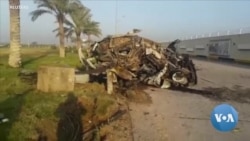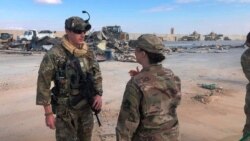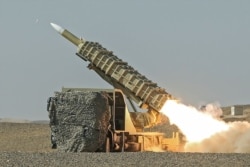Since his election in 2016, U.S. President Donald Trump has withdrawn from the Iran nuclear agreement signed in 2015 by his predecessor, Barack Obama, and imposed tough sanctions that have crippled the Iranian economy. How might the relationship between Washington and Tehran change after the U.S. election on November 3?
2020 began with the United States and Iran on the verge of war. The U.S. targeted killing of revered Iranian General Qassem Soleimani January 3 - whom Washington accused of masterminding numerous attacks in the region - sparked fury in Tehran.
It retaliated with missile strikes on U.S. bases in Iraq. No U.S. service personnel were killed and conflict was averted, but Trump kept up the pressure.
“The United States will immediately impose additional punishing economic sanctions on the Iranian regime,” Trump told a press conference January 8, the day after the Iranian missile strikes.
He also urged other signatories to follow America’s lead, using the abbreviation for the nuclear agreement’s formal title, the Joint Comprehensive Plan of Action.
"The time has come for the United Kingdom, Germany, France, Russia, and China to recognize this reality. They must now break away from the remnants of the Iran deal -- or JCPOA -- and we must all work together toward making a deal with Iran that makes the world a safer and more peaceful place.”
Trump described the nuclear deal as a flawed agreement because it allowed Iran to continue with its ballistic missile program and support for proxy militant groups in the region. European allies – along with China, Russia and Iran – remain signatories to the nuclear deal and hope the U.S. will re-join, Erica Moret, coordinator of the Geneva International Sanctions Network, told VOA recently.
“The U.S. withdrawal from the Joint Comprehensive Plan of Action, or the Iran nuclear deal, represents one of the biggest blows to global governance and multilateralism as we know it. So, of course, there are great hopes that a return to the deal could at some point be possible. Whether or not it would be palatable for a future U.S. administration to do is I think is another matter,” Moret said.
Other U.S. allies including Israel and Saudi Arabia continue to support the U.S. exit from the deal.
A statement from the Saudi Foreign Affairs Ministry at the time of the U.S. withdrawal claimed that “Iran used economic gains from the lifting of sanctions to continue its activities to destabilize the region, particularly by developing ballistic missiles and supporting terrorist groups in the region.” Iran has always denied supporting terrorist groups and accuses Riyadh of fomenting conflict in the Middle East.
Effect on Iran's economy
In the years since his withdrawal from the JCPOA, Trump has imposed a so-called maximum pressure campaign on Iran, involving multiple sanctions aimed at cutting access to international finance, blocking oil exports and crippling its economy. The Trump administration says Iran cannot be trusted and the sanctions are the best way to rein in its behavior.
Moret said the wide-ranging sanctions have had a marked effect on Iran’s economy.
“Many public and private sector companies around the world are simply too afraid to engage with a country like Iran. We saw this for example when some of the sanctions were lifted under the JCPOA. It was still very hard to persuade European and other companies to reinvest in Iran. And it’s made even worse at the moment with the COVID-19 pandemic of course,” Moret told VOA.
Trump’s rival in the presidential campaign, Joe Biden, has said he would seek to re-join the Iran nuclear deal but would impose targeted sanctions over human rights abuses, terrorism and Iran’s ballistic missile program.
However, Tehran may not trust the West after Trump’s pull-out from the 2015 deal, security analyst Julie Norman said.
“America’s credibility in terms of this treaty and agreements more generally is rather in question,” she told VOA. “And we assume that Iran would at least initially probably push back, try and work whatever leverage they have. With that said, Iran really is in a difficult point right now. They really do need whatever kind of reengagement assistance can be forthcoming.”
A United Nations arms embargo against Iran ended last month despite U.S. efforts to extend it. The expiration of the embargo was part of the JCPOA. Washington has threatened sanctions on any country selling arms to Tehran.
Meanwhile, Iran is due to hold presidential elections early next year amid concerns that hardliners in the regime could win power. Analysts say that leaves a short window to reset relations with Tehran’s current leaders if a new U.S. administration chose to do so.








